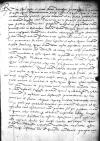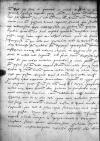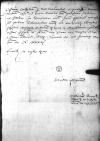Accepi ⌊⌋ Dominationis Vestrae Reverendissimae 1535-12-10⌊X-a Decembris mensis praeteriti1535-12-10⌋ ex ⌊arce Lubaviensi⌋ ad me datas, quibus scribit, ut dominum ⌊Bogusch⌋ amice commonerem, ne a promisso suo declinet, quin pactam centum aureorum pensionem integram, ex proventibus ecclesiae parrochialis in ⌊Golambya⌋ debitam, domino ⌊Georgio Hegel⌋, uti receperat, consignet, domino vero ⌊Andreae Thanczinski⌋ pro raptu decimarum per eum commisso actionem iudiciariam instituendam curarem, ut qui munere procuratorio fungar.
Scire dignetur Dominatio Vestra Reverendissima dominum ⌊Bogusch⌋, simulatque ⌊reverendissimo domino⌋ olim nostro 1535-11-21⌊sepultura peracta est1535-11-21⌋, in aulam regiam sese contulisse ob eamque rem mihi facultatem omnem mandata Dominationis Vestrae Reverendissimae illi exponendi in praesentia praesto esse non posse. Mittam vero ⌊illi⌋ propediem ⌊⌋ Dominationis Vestrae Reverendissimae ad eum scriptas atque ita prospiciam, ut illi sine mora reddantur.
Quod autem attinet munus procurationis, quod Vestra Dominatio Reverendissima in me collocatum esse ab se scribit, de hac re mihi compertum est prorsus nihil mirorque plurimum, quonam pacto venerit in mentem Dominationis Vestrae Reverendissimae opinio istius institutionis, quam revera in personam meam contulerit numquam. Non eo quidem infitias dixisse Dominationem Vestram Reverendissimam in aedibus domini ⌊custodis Cracoviensis⌋ se instituere me destinasse procuratorem, me tum, quominus id faceret, aliquot repetitis vicibus reclamante, veneratque paulo post publicus notarius per dominum ⌊Bogusch⌋ ad excipiendum eius institutionis actum paratus, sed qui posthac a Vestra Dominatione Reverendissima aliis intenta per oblivionem neglectus taedioque longae exscpectationis defessus, re infecta discesserat. Quod ipsum ita esse, ipsemet hodie hic mihi{t} retulit.
Sed alioqui, si Reverendissima Dominatio Vestra me constituisset, ne quidquam constituisset, non enim esset tutum mihi conflictari rite cum hominibus mundanis, praecipue vero cum his, qui sunt et potentes, et valde difficili ac propemodum spinoso ingenio, quique omnia, quae agunt, non ad rat[io]nis, sed affectuum suorum normam revocant.
Domino autem ⌊Bogusc[h]⌋, amico meo, non possum bonas reponere gratias, qui stude[t] me intermiscere hisce negotiis suis, ex quibus non parva invidia hominum, ne dicam capitis periculum, conflari mih[i] posset, neque enim cepit me adhuc oblivio, quid is dominus ⌊Tanczinski⌋, cum quo ille me protrudere vult in harenam, domino olim Gamratho, fratri moderni domini ⌊episcopi Premisliensis⌋, fecera[t], inflexerat namque illi vulnera aliquot in hospitio suo sedenti et nihil tale suspicanti. Sed facit dominus ⌊Bogusch⌋ inst[ar] catti, de quo vulgo iactatur proverbium: qui amet quidem piscem, sed non vult tangere flumen. Ita ⌊ille⌋ quoque cupit habere ex arenda lucrum, operam autem reicit in alios. Rogo ergo, quo possum, obnixius Reverendissimam Dominationem Vestram, non velit mihi procuratorii istius negotium demandare, siquidem ex ipsa plo...ne perspicere potest, quam non sit tutum mihi id exequi, praesertim mortuo iam ⌊reverendissimo domino⌋, olim patrono et benefactore meo, cuius auctoritatis lenocinio omnia reddebantur mihi tutiora. Quacumque vero in re alia uti opera mea valuerit, paratum me semper ac benevolum inveniet Vestra Dominatio Reverendissima, modo f[iat] eiusmodi, quae tuto et salvo capite fortunulisque meis confic[i] a me possit.
Nova haec apud nos habentur. ⌊Thurcum⌋, ingenti clade accepta in ⌊Persia⌋, reverti in ⌊Europam⌋ constans fama habet; ⌊Barbarossam⌋ spoliata insula ⌊Maiorica⌋ ⌊Constantinopolim⌋ ingressum opperire illic ⌊Thurc[um]⌋. ⌊Caesarem⌋ catholicum per tres cardinales a ⌊pontifice Romano⌋ vocatum esse ⌊[Ro]mam⌋ ad sacra Natalis Domini proxima scribitur ex ⌊Italia⌋. In ⌊Hungaria⌋ autem pacem perpetuam coivisse, sed quibus condicionibus, nondum est evulgatum.
Cristus Ihesus conservet Dominationem Vestram Reverendissimam in sua gratia quam diutissime sospitem ac felicem. Cuius gratiae me rursus diligentissime commendo.



